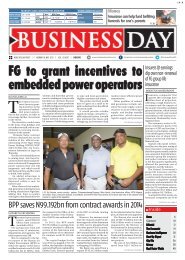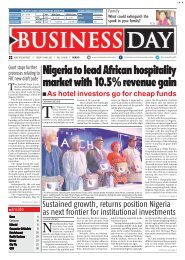Create successful ePaper yourself
Turn your PDF publications into a flip-book with our unique Google optimized e-Paper software.
THE NATION TUESDAY, APRIL 28, 2015<br />
ENERGY<br />
Hike in electricity tariff likely<br />
this week<br />
DESPITE poor power supply<br />
nationwide, the Federal<br />
Government may increase<br />
electricity tariff this week,<br />
it has been learnt.<br />
Sources told The Nation that the<br />
National Electricity Regulatory<br />
Commission (NERC) has given<br />
the electricity distribution companies<br />
(DISCOs) notice of the increase.<br />
But, it, according to the<br />
source, has not given them details<br />
of the planned hike.<br />
The commission wanted to increase<br />
tariff last December but<br />
because of Christmas, it was postponed<br />
to January. It later announced<br />
a 50 per cent reduction<br />
which Nigerians saw in political<br />
gimmick for the March 28 presidential<br />
election.<br />
Last month, NERC said most<br />
residential consumers in the R1<br />
and R2 categories did not experience<br />
any increase in tariff when<br />
rates were raised on January 1. It<br />
said the increase only affected industrial,<br />
commercial and highend<br />
residential consumers,<br />
stressing that most people in the<br />
R1 and R2 categories would begin<br />
to pay increased tariff from<br />
July 1 this year.<br />
The Commission also announced<br />
the reduction in tariff by<br />
•Continued from page 18<br />
population.”<br />
Nigeria’s inability to monetise<br />
its enormous natural gas resources<br />
is a major challenge. Gas he said,<br />
has great potential to accelerate<br />
economic growth adding that the<br />
huge deficit in our energy consumption,<br />
especially electricity,<br />
which has constrained our economic<br />
growth can be easily eliminated<br />
if gas is fully utilised. The<br />
key is to adopt a pricing regime<br />
for gas that will encourage investment<br />
in gas infrastructure, he<br />
added.<br />
On the government’s support to<br />
local content development, Wale<br />
Tinubu, the Managing Director/<br />
Chief Executive Officer of FIRST<br />
Exploration & Petroleum Development<br />
Company Limited, Mr.<br />
Ademola Adeyemi-Bero and the<br />
Chairman/Chief Executive Officer<br />
of Waltersmith Petroman Oil Limited,<br />
Mr. Abdulrazaq Isa, urged the<br />
government to persuade international<br />
oil companies (IOCs) to divest<br />
idle or low producing oil fields<br />
in their possession to local firms to<br />
increase local companies’ oil production<br />
and reserves.<br />
Power sector<br />
By Emeka Ugwuanyi<br />
50 per cent, following what it<br />
called “bombardment of complaints”<br />
from customers who decried<br />
the increase that was announced<br />
earlier this year.<br />
According to NERC Chairman,<br />
Dr. Sam Amadi, the reduction<br />
was in line with the<br />
commission’s business rules after<br />
considering the Manufacturers<br />
Association of Nigeria<br />
(MAN) protest on the implication<br />
of the January 1 hike. He said<br />
NERC took the action because<br />
merit in the argument put forward<br />
by MAN that the increase<br />
would affect their businesses.<br />
Investors in the power sector<br />
have been calling for upward review<br />
of electricity tariff to match<br />
the cost of output and also help<br />
them (investors) recoup their investment<br />
fast. According them,<br />
revenue collections from the consumers<br />
are far much lower than<br />
the investors expected pre-asset<br />
handover. The poor collection,<br />
the investors added, is also worsened<br />
by the technical and commercial<br />
losses, which are greater<br />
Challenges before Buhari<br />
The major problem of power supply<br />
is lack of diversification of<br />
sources of supply. The dependence<br />
on gas-fired power plants is a setback<br />
because when a major gas supply<br />
pipeline is vandalised, the<br />
country is thrown into darkness.<br />
Therefore, besides linking the thermal<br />
power stations with pipelines<br />
that will supply gas to them, government<br />
should also look at generating<br />
power from coal, solar,<br />
wind and building more hydro<br />
power stations and also reinforc-<br />
THE passage of the Nigerian<br />
Content Act has improved<br />
the operation of indigenous<br />
drilling operators, the President,<br />
International Association of Drilling<br />
Contractors (IADC), Nigerian<br />
Chapter, Mr. Sola Falodun, has<br />
said.<br />
He said the Act has made local<br />
operators in the oil and gas industry<br />
to play better and record good<br />
profit. “With the passage of the Act,<br />
drillers and other operators in the<br />
sector get more jobs. They finance<br />
than the assumptions given by<br />
the Bureau of Public Enterprises<br />
(BPE) before the assets were<br />
handed over to them.<br />
The Multi-Year Tariff Order<br />
(MYTO) provides a 15-year tariff<br />
path for the Nigerian Electricity<br />
Supply Industry (NESI). The<br />
MYTO methodology sets out the<br />
basis and pricing principles by<br />
which the tariff of various categories<br />
of consumers are fixed or<br />
determined. It also determines<br />
load allocation to various electricity<br />
distribution companies,<br />
the closest value chain to consumers.<br />
The MYTO usually have<br />
major review every five years<br />
but every June, a minor review is<br />
carried out by NERC. The review is<br />
determined by market fundamentals.<br />
The residential customers’ tariff,<br />
especially R1 and R2 under MYTO,<br />
are subsidised by about 50 per cent<br />
by the government because they are<br />
categorised as customers with very<br />
low incomes. Their consumption,<br />
however, is subsidised with charges<br />
from other classes of customers, according<br />
to MYTO provision. However,<br />
the planned increase in tariff<br />
is coming at a very wrong period<br />
because power supply across the<br />
country is at its worst.<br />
•From left: Chief Executive Officer, SEPLAT, Austin Avuru; Deputy Managing Director, FBN Capital, Taiwo<br />
Okeowo; and Chief Finance Officer, SEPLAT, Roger Brown at the signing ceremony of the $700 million for<br />
SEPLAT in Lagos.<br />
ing the transmission segment of<br />
the power supply value chain. The<br />
transmission network is very weak<br />
and unable to wheel 3,000megawatts<br />
(Mw) of electricity efficiently.<br />
There is also need to legislate on<br />
power theft, vandalism of power<br />
equipment and facilities, so that<br />
such vandals and thieves are appropriately<br />
punished to deter others.<br />
Enthroning the right electricity<br />
tariff and ensuring adequate gas<br />
supply will boost growth of the<br />
power industry, the experts said.<br />
‘Nigerian Content Act has benefited oil drillers, others’<br />
Conoil set to play big in N250b lube market<br />
CONOIL Plc has unveiled plans<br />
to play big in the nation’s<br />
lubricant market which is<br />
projected to hit the N250 billion mark<br />
by the end of this year.<br />
The projected high revenue from<br />
lubricant business is predicated on the<br />
expected upsurge in the demand for<br />
lubricants by the automobile and<br />
industrial sub-sectors of the economy.<br />
According to a statement, the company<br />
will invest over N5 billion in building a<br />
new lubricant manufacturing plant and<br />
filling lines, in addition to big lubricant<br />
plant in Apapa, Lagos, to significantly<br />
increase its engine oil production<br />
capacity. This will put the company in<br />
good stead to take huge advantage of<br />
the projected growth in the domestic<br />
lubricant market and invariably<br />
skyrocket its lubricant contribution to<br />
its overall turnover.<br />
The substantial increase in lubricant<br />
production, Conoil said, is projected to<br />
boost the company’s bottom-line while<br />
also increasing significantly its industry<br />
share in the lubricant segment.<br />
Conoil ranks as one of the nation’s<br />
topmost marketers of quality lubricants<br />
with a reputation for reliability and<br />
unsurpassed performance. Its popular<br />
lubricant brands of Quatro and Golden<br />
Super Motor oil hold top positions in<br />
the market and are adjudged the brand<br />
of choice. The company also has wide<br />
range of industrial lubricants for<br />
SEVEN Energy International Limited<br />
has started supplying gas to<br />
the 560 megawatts (MW) Cala-<br />
bar National Integrated Power Project<br />
(NIPP).<br />
The commercial delivery of gas to<br />
Calabar NIPP started in March, this<br />
year, and is being executed through<br />
Accugas, a wholly-owned subsidiary<br />
of Seven Energy. When operating at<br />
full capacity, Calabar NIPP will increase<br />
national power generation by over 10<br />
per cent.<br />
According to the company, gas is<br />
being supplied to the power plant from<br />
Seven Energy’s Uquo Gas Processing<br />
Facility in Akwa Ibom State through<br />
the Seven Energy pipeline network.<br />
The gas supply will enable the power<br />
plant to complete commissioning and<br />
start the delivering electricity to the<br />
national grid.<br />
The Chief Executive Officer, Seven<br />
Energy, Phillip Ihenacho, said: “Delivering<br />
a cost-effective and reliable gas<br />
supply is critical to providing sustainable<br />
power supply into the national grid<br />
to meet the government’s reform objectives<br />
and to facilitate industrial development.<br />
I am delighted that our<br />
ability to deliver an indigenous gas<br />
solution, from end to end is now being<br />
recognised by a broad range of industrial<br />
and power sector customers. Not<br />
only will the gas we supply drive en-<br />
By Akinola Ajibade<br />
big-ticket transactions, hitherto the<br />
preserve of the International Oil<br />
Companies (IOCs). The divestment<br />
of shares by the IOCs and the subsequent<br />
interest shown by independents<br />
or local operators to buy<br />
into their assets is a good omen to<br />
the industry. We hope the trend<br />
will continue in the sector,” he<br />
said.<br />
Falodun said the passage of the<br />
Petroleum Industry Bill<br />
(PIB)would revolutionise the industry<br />
because operators would<br />
adopt and adapt to new technologies<br />
and practices. He noted that<br />
crude oil theft, illegal bunkering,<br />
pipeline vandalism, and other unhealthy<br />
practices have slowed<br />
down exploration, adding that passing<br />
making relevant laws would<br />
position local operators for better<br />
performance.<br />
He said recouping investment on<br />
oil rigs is not easy, adding that<br />
with time the operators would<br />
overcome their challenges.<br />
51<br />
applications in manufacturing, textile,<br />
cement, breweries, oil exploration and<br />
producing companies, and transmission<br />
oils for the transmission and gear system<br />
of vehicles.<br />
With a total consumption of 600<br />
million litres, according to industry<br />
sources, which amounted to one percent<br />
of the world’s total demand, Nigeria<br />
ranked as the third largest consumer of<br />
lubricating oils with gross earnings of<br />
N150 billion in 2013.<br />
Notwithstanding the huge potential<br />
and contributions of the lubricant<br />
business to the growth of the nation’s<br />
economy, the market is threatened by<br />
the importation of sub-standard and offspec<br />
finished lubricants from the Far East.<br />
The Department of Petroleum<br />
Resources (DPR) and industry<br />
stakeholders have expressed concern<br />
that the local lubricant market has<br />
become a dumping ground for substandard<br />
and off-specifications imported<br />
engine oil. The DPR raised the alarm<br />
over the negative environmental and<br />
economic impact of the quasi-lubricant<br />
substances.<br />
Lubricants are technology-driven<br />
products with value-addition to base oil,<br />
one of the refined byproducts. They are<br />
necessary products to guarantee energysavings,<br />
cost-effective and maintenance<br />
of plant and machinery in industry to<br />
sustain the nation’s industrial growth<br />
and economy in general.<br />
Seven Energy begins supply to Calabar NIPP<br />
hanced power generation, but when<br />
combined with improvements in transmission<br />
and distribution, it will also<br />
facilitate industrial and commercial developments<br />
which will have a far reaching<br />
impact throughout the community,<br />
stimulating industry and generating<br />
employment as a result.”<br />
The Managing Director, Accugas<br />
Steve Tierney, said: “The Calabar NIPP<br />
is a major power plant in Calabar and<br />
a further endorsement of the quality<br />
and reliability of our services. Our<br />
strong capability across the region with<br />
ownership of gas reserves and pipeline<br />
infrastructure has enabled us to<br />
commercialise our gas assets, delivering<br />
a solution that the market has been<br />
demanding for many years. We are<br />
ready and look forward to adding more<br />
customers to our network across the<br />
South East of Nigeria, bringing affordable<br />
and reliable gas to a wider audience.”<br />
Seven Energy has invested over $1<br />
billion in the Southeast region of the<br />
Niger Delta in the last five years and<br />
since the commissioning of the Uquo<br />
Gas Processing Facility last year, the<br />
firm has also started the supply of gas<br />
to other off takers such as the Ibom<br />
Power Company, Notore Chemical Industries<br />
Limited and the United Cement<br />
Company of Nigeria, also in Calabar.<br />
How non-producing marginal fields<br />
can be productive, by firm’s chief<br />
THE Chief Executive Officer<br />
Eunisell Solutions, an indigenous<br />
oil and gas service com-<br />
pany, Mr. Dickson Okotie, has said<br />
there is hope for marginal fields that<br />
are yet to produce, in view of the imminent<br />
revocation of their licences.<br />
He told reporters at this year’s oil<br />
and gas awards in Lagos that such<br />
fields could still produce with the application<br />
of technology. He also noted<br />
that marginal field operators face<br />
many challenges ,including lack of<br />
access to finance and technical competence<br />
which have prevented them<br />
from fully benefitting from the Local<br />
Content Act.<br />
He said: “We all know that licences<br />
which were awarded for marginal<br />
fields in 2003 have expired and those<br />
whose fields are yet to produce will<br />
be revoked soon, however, there’s still<br />
hope for those fields that are not producing<br />
yet because of the type of solution<br />
we bring to industry. We have<br />
proved to hold the technical competence<br />
to develop a field in 120 days as<br />
shown in the Qua Iboe marginal field.<br />
As soon as we are able to get all parties<br />
involved, we roll out our services<br />
which may also comprise financing<br />
of the entire facility from drilling to<br />
production, in the event of the operators<br />
inability to finance the project.”<br />
He said the company has delivered<br />
unique services to various clients in<br />
the industry over the years, including<br />
the building and financing of central<br />
processing facilities for indigenous<br />
major indigenous oil and gas producing<br />
companies to help local companies<br />
benefit from the Local Content<br />
Act.

















